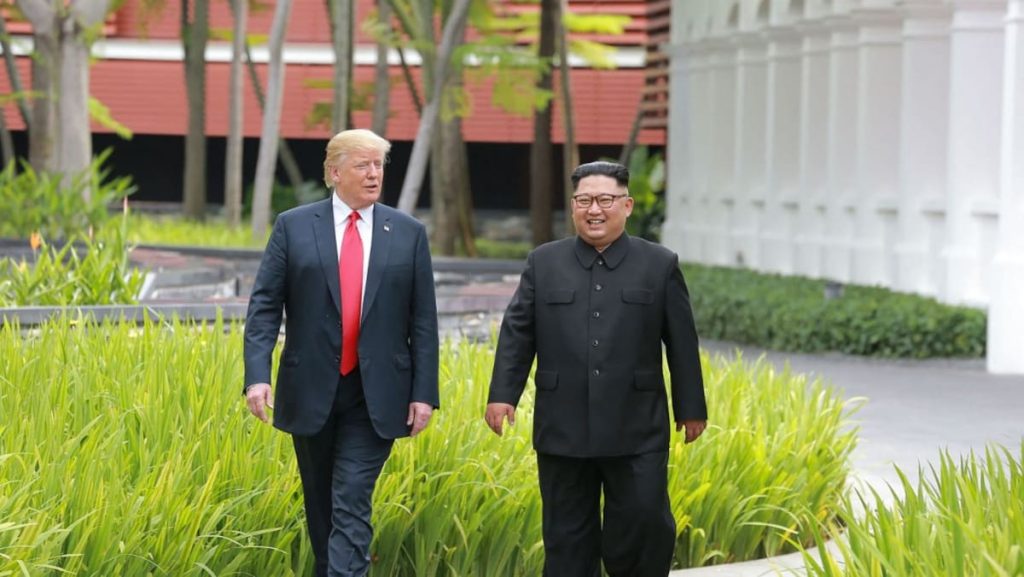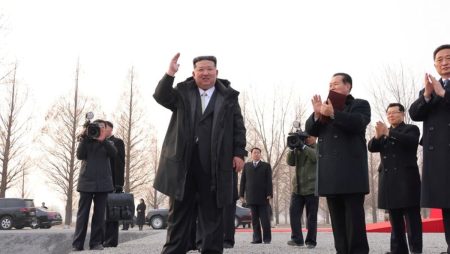The Daunting Reality: Understanding the US-North Korea Divide
The relationship between the United States and North Korea is complex and deeply strained, marked by significant political and strategic differences. These differences are not the kind that can be resolved with a single, grand gesture or a charismatic summit, no matter how much President Trump might insist that he and Kim Jong Un are "friends." The reality is that the chasm between the two nations runs far too deep to be bridged by a mere handshake or a photo opportunity. Instead, what is required is a painstaking and detailed process of negotiation, one that involves compromise, creativity, and a willingness to engage in hard, pragmatic diplomacy.
For President Trump to have any hope of reaching a meaningful agreement with North Korea, he must be prepared to present a detailed and credible offer to Kim Jong Un. This is not just about making a single, sweeping proposal but rather about developing multiple, well-thought-out options that provide room for negotiation and flexibility. The idea is to create a framework where both sides can trade concessions and find common ground, rather than insisting on a take-it-or-leave-it approach that is unlikely to succeed. This kind of detailed, iterative process is essential if the two sides are to move beyond the platitudes and posturing that have characterized their interactions so far.
Deals Without Concessions Are Dead-Ends
The notion that North Korea will simply denuclearize in response to threats or vague promises of future benefits is a fantasy that has been repeatedly disproven. President Trump has already tried this approach, and it has failed spectacularly. The stark truth is that North Korea will not give up its nuclear weapons without something tangible in return. This means that any serious negotiations will require the United States to make genuine concessions, whether in the form of sanctions relief, financial aid, diplomatic recognition, or adjustments to the U.S. military presence on the Korean Peninsula. These concessions must be meaningful enough to convince Pyongyang that the deal is worth taking, even if it means making difficult trade-offs.
It is no secret that making concessions to North Korea is politically unpopular, especially given the regime’s appalling human rights record and its history of duplicity. But the alternative—demanding unilateral disarmament without offering anything in return—is a non-starter. The events of 2017–2019, during which tensions between the two nations oscillated wildly between confrontation and fleeting moments of diplomacy, demonstrate that North Korea is not willing to negotiate without some form of compromise. This is a lesson that must be heeded if the United States is to have any chance of achieving its goals.
The Devil’s in the Details: Why a Negotiation Strategy Matters
A successful negotiation with North Korea will require more than just goodwill or charm; it will demand a carefully crafted strategy that takes into account the complexities of both sides’ positions. This means developing a range of detailed proposals that address not only the core issues of denuclearization and sanctions relief but also the broader strategic and economic concerns of both nations. These proposals should be designed to provide a framework for give-and-take, allowing both sides to find areas of agreement even when they cannot see eye-to-eye on everything.
At the same time, President Trump must recognize that any deal he strikes with North Korea will need to be underpinned by a broad coalition of support within Washington and beyond. This includes not just the various branches of the U.S. government—the Defense Department, the State Department, and Congress—but also key allies like South Korea and the wider international community. The failure of the Clinton administration’s 1990s deal with North Korea serves as a cautionary tale about the dangers of pursuing an agreement without the necessary political and institutional buy-in. Without this support, any deal risks being undermined by bureaucratic resistance or partisan opposition, as well as by the inevitable skepticism of other stakeholders.
Building a Coalition: The Importance of Buy-In
The importance of building a coalition of support for any deal with North Korea cannot be overstated. This is not just about ensuring that the agreement has the necessary political backing to survive beyond the current administration but also about creating a sense of legitimacy and sustainability that will be essential for its long-term success. Too often, negotiations with North Korea have foundered because they were seen as the personal project of a single leader, rather than the result of a broader, shared effort.
In the case of the Clinton-era deal, the lack of Republican support in Congress doomed the agreement from the start, as it became a political football in Washington. This experience should serve as a warning to President Trump: any deal with North Korea will require careful consultation and collaboration, both within the U.S. government and with key international partners. This means engaging with critics and skeptics, addressing their concerns, and finding ways to build consensus, even in the face of deep-seated differences. Without this kind of coalition-building, any agreement is likely to be short-lived and vulnerable to exploitation by those who oppose it.
Concessions: The Bitter Pill Needed for Progress
One of the most difficult truths that the United States must confront in its negotiations with North Korea is the necessity of making concessions. This is not a popular idea, especially given the nature of the North Korean regime, but it is a pragmatic reality that cannot be ignored. The simple fact is that North Korea will not abandon its nuclear weapons program without something tangible in return, whether in the form of sanctions relief, economic aid, or a reconfiguration of the U.S. military presence in the region.
These concessions will not be easy to swallow, and they will require the United States to make difficult trade-offs. For example, lifting United Nations sanctions or providing financial assistance to Pyongyang may be seen as rewarding bad behavior, and adjusting the U.S. military posture on the Korean Peninsula could raise concerns among regional allies. However, the alternative—insisting on total denuclearization without offering anything in return—is a recipe for failure, as the Hanoi summit so dramatically illustrated. By demanding that North Korea completely dismantle its nuclear program without providing any meaningful concessions, President Trump effectively shut down the negotiations before they had a chance to succeed.
Rethinking the Goal: A More Realistic Path Forward
Perhaps the most important lesson to take away from the experience of negotiating with North Korea is the need for a more realistic and nuanced approach. This does not mean abandoning the ultimate goal of denuclearization, but rather recognizing that it is unlikely to be achieved in a single step or through a rigid, all-or-nothing approach. Instead, the United States should be prepared to pursue a phased process, in which incremental steps toward denuclearization are matched by corresponding concessions from both sides.
This kind of step-by-step approach would not only make the negotiations more manageable but also provide a way to build trust and create a foundation for further progress. It would also allow both sides to address their respective concerns in a way that is balanced and mutually beneficial. For example, the United States could offer to ease some sanctions in exchange for verifiable steps toward denuclearization, while North Korea could agree to limits on its nuclear and missile programs in exchange for economic assistance and greater diplomatic engagement.
Ultimately, the path forward will require a combination of flexibility, creativity, and a willingness to compromise. It will also demand a realistic understanding of what is achievable in the short term, as well as a long-term vision for the kind of relationship the United States hopes to build with North Korea. Only by approaching the negotiations with a pragmatic and strategic mindset can the United States hope to make meaningful progress and avoid the pitfalls that have doomed previous efforts.












